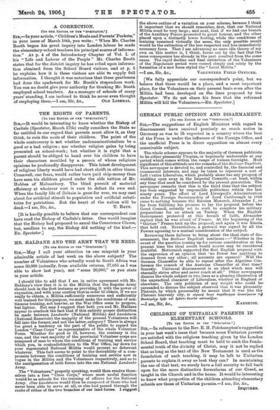GERMAN PUBLIC OPINION AND DISARMAMENT.
1T0 THE EDITOR Or THR "SPECTATOR•"1
SIR,—The suggestions of English Ministers with regard to disarmament have received precisely so much notice in Germany as was to bb expected in a country where the best of the Press is under the influence of the Foreign Office, and the unofficial Press is in direct opposition on almost every
conceivable subject. •
The whole scheme appears to the majority of German publicists to be either pleasantly Utopian, or hopelessly undesirable at any period which comes within the range of human foresight. Most significant of this attitude are the remarks of the Berliner Tageblatt. This newspaper is devoted to, and controlled by, the financial and commercial interests, and may be taken to represent a sort of Left Centre Liberalism, which probably alone has any prospect of wielding open sway in the Imperial Councils,—at least, within any time that need be considered by the present generation. The newspaper remarks that this is the third time that the subject has been suggested by responsible politicians within the last ninety years. The effort of Lord Liverpool's Administration under the Foreign Secretaryship of Lord Castlereagh in 1816 came to nothing because the Russian Monarch, Alexander I., so far from fulfilling his promise to lay the proposal before the Great Council, actually set to work to complete his military preparations for an attack on Turkey. When the English Government protested at this breach of faith, Alexander replied that he was afraid of France. At the beginning of the "thirties" France took up the proposal, and again it was Russia that held out. Nevertheless, a protocol was signed by all the Powers agreeing to a mutual consideration of the subject.
Reviewing these failures to bring about the ideal state of dis- armament, the Berliner Tageblatt continues :—" Whether in the event of the question coming up for serious consideration at the present time the ideal result would accrue may be considered doubtful. Metternich supported the first English proposal with the expression of an opinion that 'no Power has anything to demand from any other; all accounts are squared.' Will the German Chancellor be able to repeat after the Algeciras Con- ference the remark of the Austrian Chancellor at that time ? Scarcely. Universal disarmament is an ideal which men will eternally strive after and never reach at all." Other newspapers dismiss the whole subject in two lines as a pleasing illustration of the unpractical character of Liberalism, whether in England or elsewhere. The only politician of any weight who could be• persuaded to discuss the subject observed that it was pleasantly Platonic, by which presumably he meant that it was like the Platonic heavenly city, ir oilpatni rows wapdberyna &rand/awn, v. SouAop.ivecp 6p(iv nal Avant lavrbr tarroudCeir.










































 Previous page
Previous page